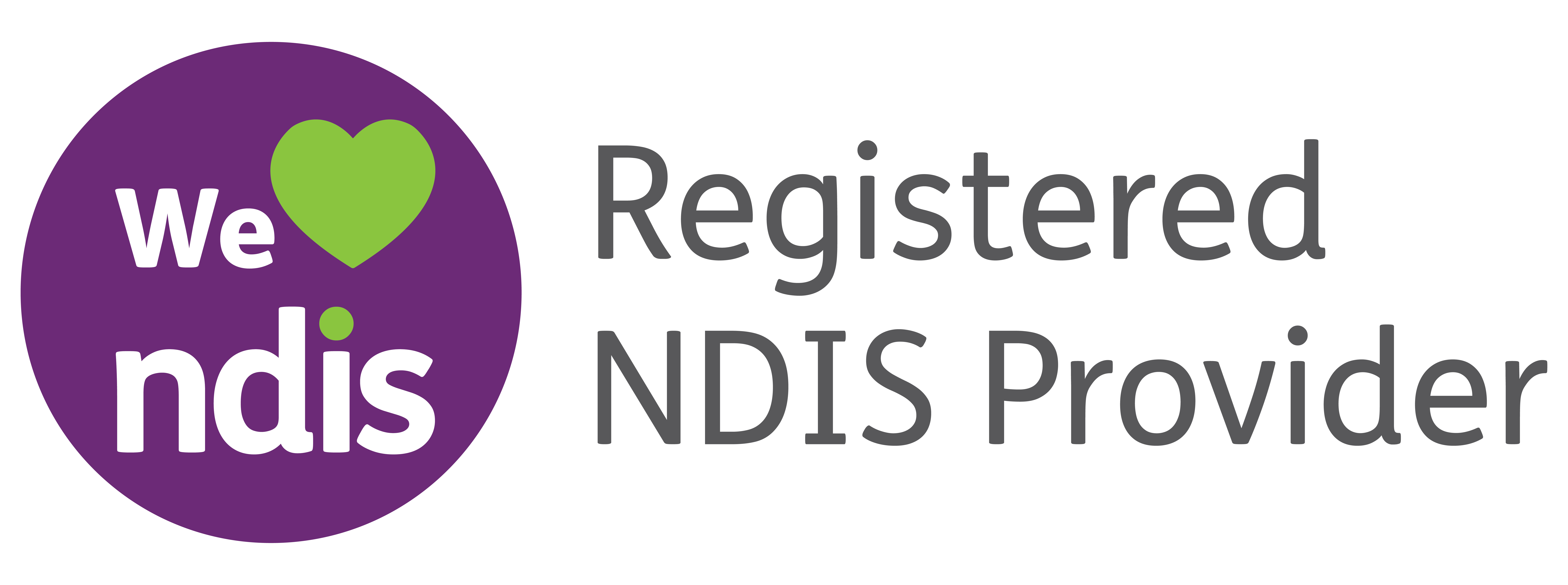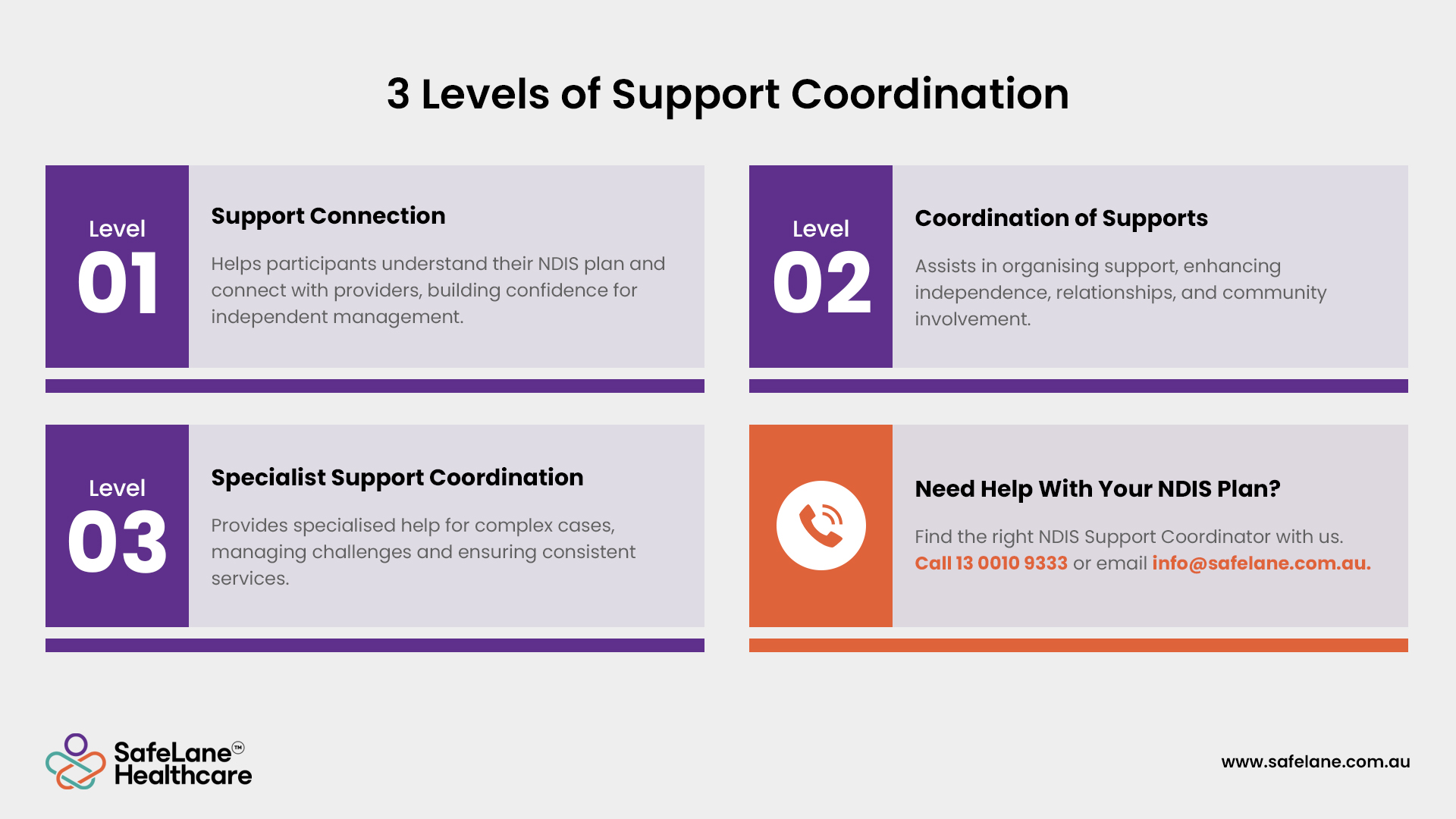
An NDIS Support Coordinator is important in helping people on the NDIS get all the support they deserve. There are different levels of NDIS Support Coordination, depending on the person’s needs. An NDIS Support Coordinator helps people with disabilities work through the National Disability Insurance Scheme (NDIS). They help people understand and use their NDIS plan, making sure they get the most out of the support and services available. The main aim is to help participants build their skills, become more independent, and reach their goals.
Keep reading to learn about what an NDIS Support Coordinator does, the three levels of NDIS Support Coordination, and how it’s paid for. We’ll also explain the difference between a Support Coordinator, a Specialist Support Coordinator, and a plan manager.
Main Responsibilities of an NDIS Support Coordinator
- Understanding the NDIS plan: Helping people understand their NDIS plan, its goals, and how to use the money in the best way.
- Connecting with service providers: Helping to find and link up with the right NDIS service providers (like therapy, personal care, or community activities).
- Coordinating support: Making sure all the different services work well together and the person’s needs are being looked after.
- Monitoring progress: Keeping an eye on how things are going and checking that the services match the person’s goals.
- Crisis management: Helping out if any problems pop up with getting or using support.
- Building capacity: Teaching the person how to manage their support on their own over time, to help them become more independent.
What Is NDIS Support Coordination?
NDIS Support Coordination helps people build the skills they need to access the right support services. It aims to assist participants in understanding their NDIS plan and how to use it to reach their goals. It also connects them with NDIS providers and other sources of help, such as community groups or government services. By doing this, it builds participants’ confidence and ability to navigate the NDIS system on their own.
Understanding the 3 Levels of Support Coordination
- Support Connection: This is for people who only need a little bit of help to understand and find services, but can mostly manage their NDIS plan on their own.
- Support Coordination: This is for people who need regular help to manage their disability support services and handle more complicated situations.
- Specialist Support Coordination: This is for people with complex or high-risk needs who need highly skilled support. It’s important for those who struggle to understand or use the NDIS system or need extra help to manage and get the most out of their support.
What Is Specialist Support Coordination?
Specialist Support Coordinators help you sort out complex support options under the NDIS. This support is for a limited time and aims to tackle barriers and make your support easier to manage. It’s about achieving clear goals while managing risks related to your disability.
Who Can Benefit From a Specialist Support Coordinator?
A Specialist Support Coordinator can help you handle any issues that might affect the support you need to reach your NDIS goals. For example, if you’re facing homelessness or are involved with agencies like the justice system or child protection, they can help connect you to mainstream or state-funded services.
They can also organise your programs and case meetings, making sure all your services work well together.
Who Can Apply for Specialist Support Coordination?
A Support Coordinator, NDIS participant, or key stakeholder can request Specialist Support Coordination. The National Disability Insurance Agency (NDIA) will then decide if it’s reasonable and necessary to include this funding in your NDIS plan.
NDIS Support Coordinator vs. Specialist Support Coordinator
There is some overlap between NDIS Support Coordination and Specialist Support Coordination. Your NDIS plan can include various types of Support Coordination funding. The key difference is that Specialist Support Coordination (Level 3 funding) focuses on managing risks or crises. This support helps you assess and implement strategies to reach your goals while reducing risks.
You can have funding for both types of coordination or just for Specialist Support Coordination.
NDIS Support Coordination vs. Plan Management
NDIS Support Coordination and NDIS plan management often get mixed up. Both roles help participants make sure they get all the support they’re entitled to under their NDIS plan, but they do different things.
NDIS plan management helps participants manage their funding. This includes explaining how the funds work, paying service providers, and helping participants improve their money management skills. On the other hand, NDIS Support Coordination is for participants who find it hard to access their support on their own. It also helps them build skills so they can eventually manage their own support without help.
How Is NDIS Support Coordination Funded?
NDIS Support Coordination funding comes from the participant’s capacity-building funds. The amount of funding can be different for each person because it depends on what is seen as “reasonable and necessary.” This looks at what the participant can do and the support they get from family and friends.
While the funding amounts can vary for each participant, NDIS Support Coordination funds are usually fixed. This means participants can only spend up to a set amount for NDIS Support Coordination services.
If your plan doesn’t specify a level of support coordination, you can choose the amount that works best for you.
What Does an NDIS Support Coordinator Do?
An NDIS Support Coordinator has a lot of different tasks. According to the NDIS, their job includes:
Task | Description |
Helping participants understand their NDIS plan | Explaining how the NDIS plan works. |
Planning and coordinating support with participants | Working together to set up support and services. |
Connecting participants with services and supports | Finding the right services for each participant. |
Setting up and keeping supports in place | Making sure supports are running smoothly. |
Organising service agreements and bookings | Arranging agreements and bookings for services. |
Knowing what providers can charge for | Understanding the costs of services. |
Spotting potential problems in getting support | Planning ways to overcome barriers to support access. |
Coaching participants on how to get support | Teaching participants how to access the services they need. |
Providing reports to the NDIA | Sending updates and reports to the NDIS. |
Working with participants, their support workers, and family | Helping everyone work together for the participant’s benefit. |
Supporting independence for participants | Encouraging participants to do things on their own. |
Planning for unexpected changes | Getting ready for things like moving or hospital visits. |
Creating plans for crisis situations | Making strategies to avoid or handle emergencies. |
Submitting requests for plan reassessments | Asking for reviews of participants’ plans. |
Using preferred communication methods | Communicating in the way that the participant prefers. |
Participants should be involved in their own NDIS Support Coordination. An NDIS Support Coordinator’s job is to help them share their preferences and make choices. A good NDIS Support Coordinator empowers participants to express themselves rather than making decisions for them.
Helping People with Disabilities: Choose NDIS Support Coordinator from SafeLane Healthcare
Support coordinators are really important in the disability services field, helping people with disabilities and their families. They work hard, stand up for their clients, and use their skills to improve the lives of those they support.
SafeLane Healthcare is a great example of how NDIS Support Coordinators are dedicated to providing top-notch help to people with disabilities. With SafeLane’s strong support, participants can expect a tailored and thorough approach to reaching their goals and dreams.
By taking on the roles and responsibilities mentioned here, NDIS Support Coordinators at SafeLane Healthcare help individuals with disabilities start a meaningful journey towards independence, inclusion, and a better future.
Need help with your NDIS plan? Contact our NDIS Support Coordinator today or give us a call at 13 0010 9333.
Conclusion
NDIS Support Coordinators play a vital role in helping people with disabilities use the National Disability Insurance Scheme (NDIS). They help participants understand their NDIS plans and connect them with the right services to reach their goals. These coordinators not only manage services but also help participants become more independent, boosting their confidence and self-reliance. By working with an NDIS Support Coordinator, participants can make the most of their NDIS plans and access the services they need, leading to a better quality of life.
Subscribe Our Newsletter
Join our newsletter for community updates and resources.




